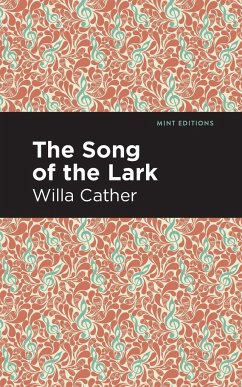
The Song of the Lark
Versandkostenfrei!
Versandfertig in 6-10 Tagen
10,99 €
inkl. MwSt.

PAYBACK Punkte
5 °P sammeln!
Willa Cather's "The Song of the Lark" offers a rich tapestry of life in a small town and the quest for artistic fulfillment. The novel is a masterful blend of lyrical prose and vivid imagery, capturing the struggles of Thea Kronborg, a talented young singer, as she navigates the complexities of ambition and identity. Set against the backdrop of the early 20th-century American West, Cather employs a modernist narrative style that reflects the protagonist's internal challenges and evolving passions. This semi-autobiographical work echoes Cather's desire to explore the intersections of art, cultu...
Willa Cather's "The Song of the Lark" offers a rich tapestry of life in a small town and the quest for artistic fulfillment. The novel is a masterful blend of lyrical prose and vivid imagery, capturing the struggles of Thea Kronborg, a talented young singer, as she navigates the complexities of ambition and identity. Set against the backdrop of the early 20th-century American West, Cather employs a modernist narrative style that reflects the protagonist's internal challenges and evolving passions. This semi-autobiographical work echoes Cather's desire to explore the intersections of art, culture, and personal growth, showcasing the influences of the natural landscape and community on the creative spirit. Willa Cather's own upbringing in Nebraska, alongside her exposure to the Midwestern artistic environment, profoundly shaped her literary voice. Known for her keen observation of character and setting, Cather drew inspiration from her experiences as a young writer, often reflecting on the role of women in the arts during her time. Her deep understanding of rural America and the struggles faced by its inhabitants informs her rich character development and empathetic storytelling. "The Song of the Lark" is an essential read for anyone interested in the evolution of American literature and the exploration of the artist's journey. Cather's nuanced portrayal of Thea's aspirations, intertwined with themes of resilience and creativity, makes this novel not only a poignant reflection on the pursuit of dreams but also a timeless exploration of the human spirit. Readers will find themselves enchanted by Cather's prose, resonating with Thea's struggles and triumphs.












